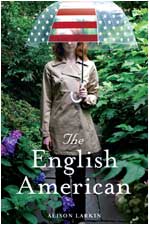
While nature versus nurture may be one of those perennial questions, for people like Pippa Dunn, the protagonist of Alison Larkin’s new novel The English American, it’s not just academic. Pippa is the eldest daughter in a stiff-upper-lipped British family; she knows how to make a proper cup of tea, likes Marmite, and so on. However, where the rest of the Dunn family is neat and orderly, quiet, and focused, Pippa is outgoing, messy, artistic, and spontaneous. She’s always losing her things, forgetting to scrape the bowl clean before putting it in the sink, and she secretly hates Scottish dancing. She’s not happy at just any old job — she wants to follow her bliss and write plays. Pippa’s sure that her personality traits reflect those of her birth parents; she’s known that she was adopted since she was a small child. Now, as an adult, Pippa learns her parents are American — Southerners to be exact.
Feeling rudderless and out of place in England, Pippa tentatively reaches out to her birth mother in the United States, hopeful that she will measure up to the ideal that Pippa’s carried with her all these years: “She was beautiful, and delicate, with red hair, like mine, only hers wasn’t springy … The sight of her filled me with warmth and made all the fear go away.”
Her reunion with Billie, a flighty and exuberant redhead, is at first validation for Pippa — here is the woman from whom she inherited her enthusiasm for life, her creativity, and her relaxed attitude toward tidiness. Pippa also reconnects with her father Walt, a Washington, D.C.–area businessman who is actively involved in international affairs.
Joy and relief at finding her appearance and personality reflected in the people who gave her life soon turn to the cold realization that while Billie and Walt may be her parents, they don’t behave like family. Billie’s manipulative attempts to make Pippa reciprocate her neediness in the relationship and Walt’s hesitance to divulge Pippa’s existence to his wife and children leave Pippa feeling as out of place as she did before.
The English American is threaded with a romantic subplot that expertly and subtly evokes Pippa’s assumptions about other people’s identity as she struggles with her own. It provides a nice twist to the main storyline, save for when it involves Nick, a tortured artist type whom Pippa thinks she loves from afar, and who appears in the book almost exclusively via email messages. Where the relationship between Pippa and Nick is concerned, the storyline goes off the rails a bit, since so little about Nick is revealed until the final chapters, and the only communication between him and Pippa is through email; he’s a comparatively flat character.
Alison Larkin’s take on the issue of identity, while couched in a fast-paced contemporary novel, infuses the subject with realism, humor, and compassion. Larkin’s writing is at her finest when she is plumbing the depths of Pippa’s psyche. The novel echoes elements of her one-woman show, The English American. Larkin’s own life aligns with Pippa’s somewhat, as Larkin too is an American-born adoptee raised by a British family.
From the red tape and bureaucratic delays Pippa encounters in trying to obtain the names and contact information of her birth parents, to introducing herself (albeit with a posh British accent) in a bar as a “redneck,” Larkin’s ability to know just when to use a light touch buoys the darker, more emotionally powerful scenes in which Pippa’s self-reflection takes her to the depths of acknowledging who she is, who she wants to be, and how much she may or may not owe her parents.
Pippa comes to realize it is up to her alone to reconcile her roots and her upbringing. Until she can navigate the rocky boundary between genetic and environmental influences, she can never feel comfortable in her own skin. And while people may continue to argue about the influence of nature versus nurture for as long as they’re able, at least Pippa Dunn finds peace as she settles the question for herself.
- Follow us on Twitter: @inthefray
- Comment on stories or like us on Facebook
- Subscribe to our free email newsletter
- Send us your writing, photography, or artwork
- Republish our Creative Commons-licensed content

